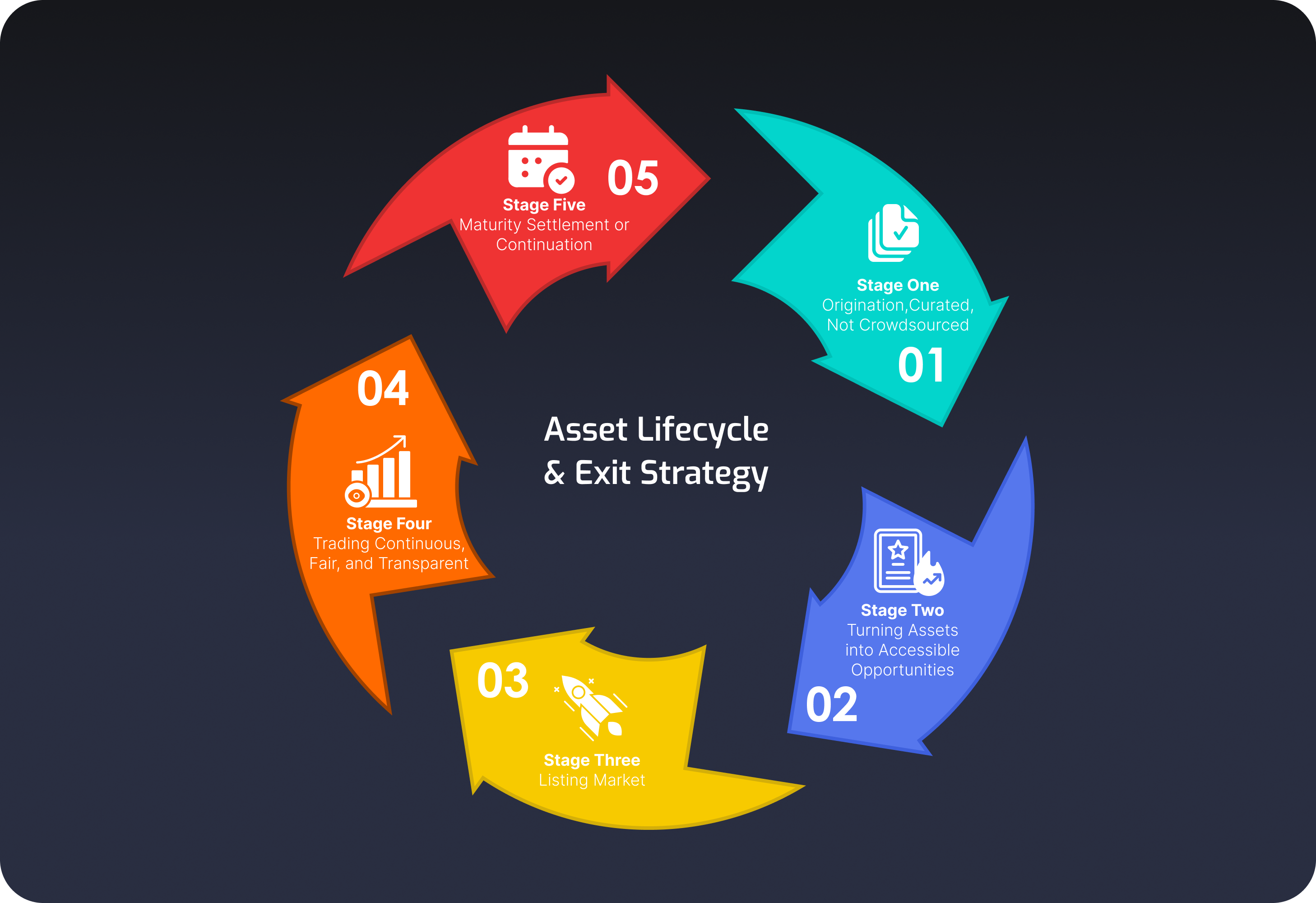Asset Lifecycle & Exit Strategy
Every investment on Karpous follows a clear lifecycle from origination to maturity. Our process ensures that every dollar invested flows into a real, yield-generating asset and that liquidity remains available throughout the asset's life without exposing the platform or investors to systemic risk.
Karpous transforms traditionally static, institutional investments into digitally tradable, real-world opportunities without changing the economics of the underlying assets.

Stage One: Origination
Curated, Not Crowdsourced
Every asset begins with origination and curation by the Karpous team. We source opportunities from reputable operators, verified industry partners, and regulated issuers across different industries, such as: infrastructure, energy, logistics, and industrial production sectors. Each opportunity undergoes due diligence on:
Asset Fundamentals & Performance
Evaluation of the asset's cash flow consistency, yield stability, and operational performance, verified through real financial data and third-party analysis.
Operator Reliability & Financial Health
Review of the company's track record, management expertise, and governance standards, including audited financials, debt ratios, and outstanding liabilities to ensure long-term sustainability.
Licensing & Legal Authorization
Verification that the operating company holds all valid operational permits, sector-specific licenses, and maintains good legal standing in its jurisdiction of operation.
Legal & Structural Integrity
Confirmation that each investment is established through a compliant Special Purpose Vehicle (SPV) or trustee-based framework, ensuring clear asset segregation, custodial control, and enforceable investor rights.
Jurisdictional & Regulatory Risk
Assessment of the asset's operating environment including regulatory stability, repatriation policies, tax frameworks, and local enforcement reliability to safeguard investor capital.
Company Performance & Alignment
Independent review of the company's overall business health, strategic alignment with asset objectives, and ability to sustain operational commitments over the asset's lifecycle.
Ongoing Verification & Monitoring
Continuous evaluation post-listing, with periodic reporting, on-chain data validation, and independent audits to ensure transparency and early detection of anomalies.
Only assets that pass Karpous's internal review and meet our institutional thresholds advance to issuance.
Stage Two: Issuance
Turning Assets into Accessible Opportunities
Once approved, the asset is digitally structured into investment units. Each unit is represented by a digital ownership certificate – a secure, verifiable record of investment participation. These certificates are issued directly to investors' managed accounts within the Karpous platform.
Key characteristics of the certificates:
Each certificate corresponds 1:1 to a defined share of the underlying asset or pool.
Investors receive direct exposure to the asset's yield and potential appreciation.
All certificates are transparently recorded and auditable.
Stage Three: Listing
Market-Based Liquidity, Not Institutional Redemption

Once issued, each asset series is listed on the Karpous Exchange, enabling peer-to-peer liquidity without institutional dependency. Investors can trade their digital certificates anytime with other verified members. Unlike traditional products, your liquidity doesn’t depend on a bank or fund holding reserves it depends on market participation and transparent pricing.
This structure removes the fragility of institutional balance sheets and replaces it with open-market equilibrium.
Stage Four: Trading
Continuous, Fair, and Transparent
All trading activity occurs directly within the Karpous platform. Prices are automatically calculated using a Fair Value Adjustment Model, ensuring equity between early sellers and new buyers.
The Fair Value Adjustment Model
This model protects both sides of every transaction:
If you've earned part of your asset's yield and choose to sell early, your certificate's resale price automatically adjusts.
The model deducts:
Yield already distributed to you, and
Time-value depreciation based on how long the asset has been active.
This ensures that the new buyer purchases the asset at a fair, discounted rate reflecting remaining yield potential below original issuance price.
The result:
- Early sellers gain immediate liquidity.
- New buyers enter at an equitable value.
- The asset lifecycle continues without disruption or redemption pressure.
This mechanism transforms liquidity from a liability into a market utility.
Stage Five: Maturity
Settlement or Continuation
When an asset reaches maturity (for example, a five-year contract concludes):
The original investors receive their final yield distribution and principal.
The digital certificates for that asset series are retired and recorded as completed.
In select cases, new cycles of the same asset class may open as fresh Editions.
This structured process ensures full clarity from start to finish every investment, every yield, every redemption.
The Benefits of a Market-Based Lifecycle
Why It Matters
By replacing the institutional redemption model with a market-based liquidity model, Karpous achieves what traditional finance cannot:
Continuous liquidity without systemic risk.
Universal access without compromising asset integrity.
Transparency without complexity.
This isn't just a new platform it's a new lifecycle for financial participation.